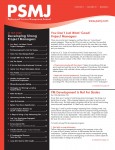 When I speak to groups about time management, I ask the audience about their most common reason for not exercising. They always say the same thing: “I don’t have the time.”
When I speak to groups about time management, I ask the audience about their most common reason for not exercising. They always say the same thing: “I don’t have the time.”
Unarguably, that’s the most common reason, but it’s not a valid excuse, I say to the audience. “It’s not that you don’t have the time,” I explain, “it’s that you don’t make the time.”
We all have a list of activities that we want to do, and need to do, in a given day, week, month, and year. From among those activities, the ones that we choose to do are those that we consider to be a priority. Whether consciously or not, we make decisions all the time about which activities are priorities for us, and which are not. When we say that we don’t have the time to exercise, for example, we are saying that we are choosing not to make exercise a priority.
I spoke to a group of executives at a large engineering firm recently. As I always do before such sessions, I had a conversation with the CEO to ask him for key issues at the firm. He said that people were perpetually late turning in expense reports, time sheets, and paperwork for invoicing clients. All of these people, the CEO told me, are excellent engineers, hard workers, and dedicated and valued employees, and yet they were neglecting essential tasks.
Details, such as the reports that this CEO was looking for, are often neglected by A/E/C professionals because they tend to focus on delivering services, avoiding necessary evils such as paperwork. The thing is, even if you do incredible work for clients, you must bill them if you expect to get paid! If you don’t fill out your time sheets, you can’t even begin the billing process. And if you don’t hand in expense reports, your firm can’t bill the clients for reimbursable expenses (or figure those expenses into overhead, where applicable.)
In my session to the engineering executives, I first made an analogy to what the CEO had told me. People who say they don’t have time to exercise are undoubtedly incredibly busy with work and family obligations, I pointed out, but that if they want to exercise, they have to choose to make it a priority, and they could make it happen if they want to. And if they don’t want to make it a priority, at some point declining health may cause them to need to make it a priority. Similarly, I suggested making time sheets, invoicing, and expense reports a priority, and that even if they don’t want to do that, they and their employees need to do it for the health of the business.
I saw a lot of embarrassed faces and heard uncomfortable laughter. I also saw many nods of agreement, and furious note-taking on the form I had handed out to jot down action items.
Make time management and better accountability for the decisions that go into time management a priority action item for everyone at your firm.
